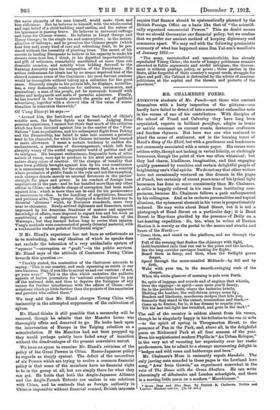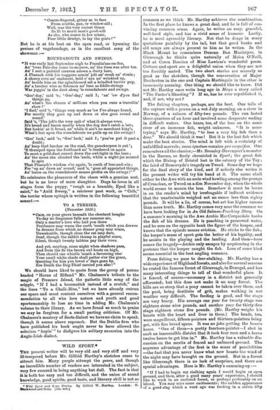MR. CHALMERS'S POEMS.
ATTENTIVE students of Mr. Punch—not those who content themselves with a hasty inspection of the pictures—can hardly have failed to detect of late a somewhat unfamiliar note in the verses of one of his contributors. With disciples of the school of Praed and Calverley they have long been acquainted, experts in brilliant persiflage, adepts in ironic or satiric comment on current events, dexterous craftsmen and fearless rhymers. But here was one who ventured to plead the cause of sentiment, not in the burning tones of Hood's Song of the Shirt, but with a gentleness and tenderness not commonly associated with a comic paper. His verses were seldom witty, though not lacking in verbal felicity, or strikingly humorous, though the point of view was often whimsical ; but
they had charm, kindliness, imagination, and that engaging quality possessed by sunshine and certain delightful people of
heightening one's vital spirits. We do not say that other writers have not occasionally ventured on this domain in the pages of Punch, but certainly of recent years none of his lyrical light horsemen has done so more consistently than Mr. Chalmers.
A critic is happily relieved in his case from instituting com- parisons, because Mr. Chalmers follows a path unfrequented by his colleagues. And as he eschews personalities and topical allusions, the ephemeral element in his verse is proportionately
reduced. He may write about Bond Street, but it is not a photograph of Bond Street on a particular day ; it is Bond Street in May-time glorified by the presence of Dolly on a
hat-hunting expedition. So, too, when he writes of Euston Station it is merely as the portal to the moors and straths and braes of the North:—
" Come, then, and stand on the platform, and see through the arches,
Full of the evening that flushes the chimneys with light, Gold-burnished rails that run out to the pines and the larches, See the long corridor carriages busking for flight; Board them in fancy, and then, when the twilight grows deeper, Speed through the moon-mantled Midlands—by fell and by firth, Wake with your tea, in the smooth-swinging rush of the sleeper, When the white glamour of morning is pale over Perth.
So, spite of luggage and crowds and of engines that whistle, Over the riggings—in spirit—once more you'll descry, On to the perilous butts, where the batteries bristle, Blotting the heather, the well-driven coveys come by ; Bracken and blaeberry, murderous midges that bite you, Summits that stand to the sunset, tremendous and stark,— Come up to Euston, for lo, it has dreams to requite you, Till the last tail-light has twinkled, and gone in the dark!"
The call of the country is seldom absent from his verses, though he is singularly happy in his tributes to the rus in urbe —to the spirit of spring in Throgmorton Street, to the presence of Pan in the Park, and, above all, in the delightful poem on Richmond Park at all four seasons of the year. Even his sophisticated modern Phyllis " An Urban Eclogue," in the very act of vaunting her superiority over her rustic predecessors, has to admit to a strange unreasoning delight in
"hedges and wild roses and buttercups and bees."
Mr. Chalmers's Muse is eminently vagu/a blandula. The
only jarring note sounded in these pages is the Lowland love song, " Awa' from Gowrie," an experiment somewhat in the
vein of The House with the Green Shutters. He can write charmingly of debutantes and London schoolgirls, and there
is a moving little poem on a modern "Marchioness."
Lo•i:Irdoener■ maDansmnp.eisanad.-d-al.us E3Dsayesd.. netByaratrick B. Chalmers. Dublin assl
"Coarse-fingered, grimy as to face From scuttle, pan, or window-sill ; Well, was the very rosiest Grace So fit to merit man's good-will As she, who comes in low estate, Poor little drudge, to lay the grate ?"
But he is at his beat on the open road, or hymning the praises of vaga,bondage, as in the excellent song of the showman
ROUNDABOUTS AND SWINGS.
It was early last September nigh to Framlin'am-on-Sea, An' twas Fair-day come to-morrow, an' the time was after tea. An' I met a painted caravan adown a dusty lane, A Pharaoh with his waggons comin' jolt an' creak an' strain ; A cheery cove an' sunburnt, bold o' eye an' wrinkled up, An' beside him on the splashboard sat a brindled tarries pup, An' a lurcher wise as Solomon an' lean as fiddle-strings Was joggin' in the dust along 'is roundabouts and swings.
• Goo'-day,' said 'e ; Goo'-day,' said I; 'an' ow d'you find things go,
An' what's the chance o' millions when you rims a travellin' show ?'
'I find,' said 'e, things very much as 'ow I've always found, For mostly they goes up and down or else goes round and round.'
Said 'e, The job's the very spit o' what it always were, It's bread and bacon mostly when the dog don't catch a 'are; But lookin' at it broad, an' while it ain't no merchant king's, What's lost upon the roundabouts we pulls up on the swings !
`Goo' luck,' said 'e; 'Goo' luck,' said I; 'you've put it past a doubt ;
An' keep that lurcher on the road, the gamekeepers is out '; 'E thumped upon the footboard an' e lumbered on again To meet a gold-dust sunset down the owl-light in the lane ; An' the moon she climbed the 'azels, while a night-jar seemed
to spin
That Pharaoh's wisdom o'er again, 'is sooth of lose-and-win ; For 'up an' down an' round,' said 'e, goes all appointed things, An' losses on the roundabouts means profits on the swings!"
He celebrates the pleasures of the chase with a genuine zest, but he is no lover of mere slaughter. Dogs he loves in all stages from the puppy, "rough as a bramble, Eyed like a saint," to "Auld Sweep," a retriever past work, or "Crib," the terrier whose epitaph is written in the following beautiful
sonnet
TO A TERRIER.
(November 1910.)
"Cans, on your grave beneath the chestnut boughs To-day no fragrance falls nor summer air, Only a master's love who laid you there
Perchance may warm the earth 'neath which you drowse In dreams from which no dinner gong may rouse, Unwakeable, though close the rat may dare, Deaf, though the rabbit thump in playful scare, Silent, though twenty tabbies pay their vows.
And yet, mayhap, some night when shadows pass, And from the fir the brown owl hoots on high, Then should one whistle 'neath a favouring star Your small white shade shall patter o'er the grass, Questing for him you loved o' days gone by, Ere Death the Dog-Thief carried you afar!"
We should have liked to quote from the group of poems headed "Horns of Elfland" Mr. Chalmers's tribute to the magic of Treasure Island, the pathetic little song of the cripple, "If I had a broomstick instead of a crutch," and the lines "To a Chalk-Blue," but we have already outrun our space and must content ourselves with a general recom- mendation to all who love nature and youth and good sportsmanship to lose no time in adding Mr. Chalmers's volume to their library. As we have found so much to praise we may be forgiven for a small parting criticism. Of Mr. Chalmers's mastery of Scots dialect we have no claim to speak, though it seems above reproach. But the Dublin firm who have published his book ought never to have allowed the solecism " kapin' " to disfigure his solitary excursion into the Anglo-Irish dialect.







































































 Previous page
Previous page